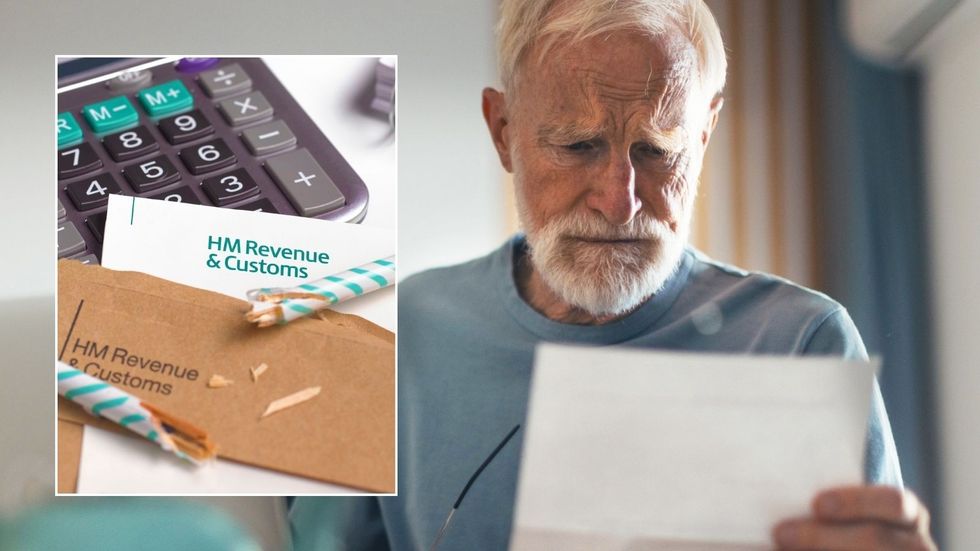Expert reveals brutal reality facing elderly farmers after Reeves’ tax raid
GB NEWS
Analysts are sounding the alarm over a little-known "tax trap" which could see returns from savings interest and dividends slashed
Don't Miss
Most Read
Trending on GB News
Britons are at risk of being slapped with a 60 per cent charge from HM Revenue and Customs (HMRC) as part of a "tax trap" on savings, according to analysis from interactive investor. Those earning over £100,000 face a sizable levy on additional income due to a complex interaction between personal allowance tapering and tax rules.
The "trap" occurs when extra income from savings interest or dividends pushes workers over the threshold, triggering a double tax hit on their earnings. This means income is taxed once at the marginal rate and again through the reduction of their personal allowances.
Notably, the punitive rates do not just affect regular income - they can catch out business owners receiving dividends, individuals who have inherited money, or those who receive bonuses. Many are unaware of how this additional income interacts with the tax system, potentially leading them to pay more tax than necessary.
Someone earning £100,000 who receives £5,000 in savings interest would lose £2,500 of their personal allowance. This results in a tax burden of £2,800, significantly higher than the £1,800 paid by higher-rate taxpayers whose earnings fall below the £100,000 threshold.
The burden becomes even more severe for those with £10,000 in savings interest, rising to £5,800 in tax. The effect stems from the combination of a 40 per cent income tax rate plus an additional 20 per cent from the personal allowance reduction, creating the effective 60 per cent tax rate.
Do you have a money story you’d like to share? Get in touch by emailing money@gbnews.uk.

Analysts are sounding the alarm over a little-known "tax trap" which could see returns from savings interest and dividends slashed
GETTY
This tax trap can also affect eligibility for key financial support schemes, including 15 and 30 hours free childcare and the Tax-Free Childcare account. Even marginally exceeding the £100,000 threshold can result in complete loss of these benefits.
Myron Jobson, a senior personal finance analyst at interactive investor, said: "The quirks of the UK income tax regime mean that additional income from savings interest or dividends, which pushes workers into the £100,000 to £125,140 tax band, is taxed at a higher effective rate than for those in the additional-rate tax band."
"This is because additional income within this range is effectively taxed twice: once at your marginal income tax rate and again indirectly, as the tapering of your personal allowance means that additional tax is applied to your income," he added.
"Business owners receiving dividends or individuals who have inherited money, earned bonuses, or gained windfalls through other means could inadvertently breach the £100,000 threshold and face punitive tax rates.

People who earn money through dividends could be hit with a 60 per cent tax charge
GETTY"Many people in these groups may not be aware of how additional income interacts with the tax system, and without careful tax planning, they risk paying more tax than necessary."
Dividend income faces similarly harsh treatment under this tax system, with calculations showing an effective tax rate of 53.75 per cent. This combines the higher-rate dividend tax of 33.75 per cent with the 20 per cent effect from the personal allowance taper.
For someone receiving £5,000 in dividends, this results in a tax burden of £2,519. The burden increases substantially for those receiving £10,000 in dividends, rising to £5,206 in tax payments.
These rates are particularly punitive as they exceed the tax rates faced by those in the additional-rate tax band. The impact is especially significant for business owners who rely on dividend payments as part of their income strategy.
However, there are ways to mitigate this tax burden, with pension contributions emerging as one of the most effective strategies. Analysts recommend increasing pension contributions to lower potential liability.
Contributions can reduce someone's adjusted net income, bringing their earnings under the £100,000 limit. As well as cutting tax bill, Britons will be able to boost their retirement savings, with the added benefit of tax relief.
LATEST DEVELOPMENTS:

Britons are being taxed on their savings
PEXELSAccording to interactive investor, making pension contributions through a salary sacrifice scheme means every £1 contributed will reduce your adjusted net income by the same amount.
If someone make contributions to a self-invested personal pension (SIPP) as a higher-rate taxpayer, then they will be “grossed up”.
This will further slash their adjusted net income. For example, £600 contributed will reduce your adjusted net income by £1,000.
Savers are also encouraged to take advantage of tax-free products, such as ISAs, to mitigate any potentially high tax bills.








